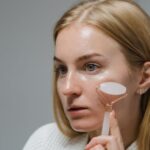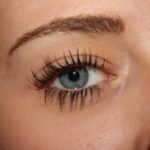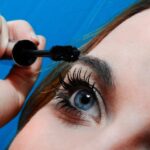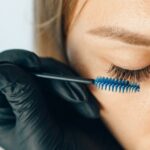Mascara can be harmful if it contains harmful ingredients or if not used and removed properly. To minimize risks, choose safer mascara options and practice proper removal techniques.

Potential Health Risks of Mascara Use
Eye Irritation and Infections
Mascara can sometimes cause eye irritation, particularly for individuals with sensitive eyes or contact lens wearers. The risk of irritation increases if the mascara contains harsh chemicals or allergens. In more severe cases, using old, contaminated, or expired mascara can lead to eye infections like conjunctivitis (pink eye) or even corneal ulcers.
Allergic Reactions
Allergic reactions to mascara are usually triggered by specific ingredients in the formula. These reactions can cause redness, itching, or swelling around the eyes, and in some cases, respiratory symptoms. Patch testing a new mascara on the inside of the forearm can help identify any potential allergies before applying it to the eyes.
Clogged Glands
Applying too much mascara or failing to remove it properly at the end of the day can cause the meibomian glands along the eyelid margin to become clogged. These glands secrete oil to maintain the health and stability of the tear film. Clogged glands can lead to styes, chalazia, or even meibomian gland dysfunction (MGD), resulting in dry, irritated eyes.
Mascara Ingredients to Avoid
Parabens
Parabens are synthetic preservatives found in various cosmetics, including mascaras. They have been linked to hormonal disruption, breast cancer, and other health risks. To minimize exposure, look for mascaras labeled “paraben-free” or those that use alternative preservatives like phenoxyethanol or ethylhexylglycerin.
Formaldehyde Releasers
Formaldehyde-releasing preservatives are used in some mascaras to prevent bacterial growth. However, they can cause irritation and have been linked to allergic reactions and potential health risks. Ingredients to avoid include DMDM hydantoin, imidazolidinyl urea, diazolidinyl urea, and quaternium-15.
Carbon Black
Carbon black is a pigment used in some mascaras to achieve a rich, dark color. However, studies have linked carbon black to increased cancer risk and lung disease. To minimize exposure, opt for mascaras that use alternative pigments like iron oxides, ultramarines, or titanium dioxide.
Synthetic Fragrances
Artificial fragrances in mascara can cause irritation and allergic reactions, particularly for those with sensitive skin or eyes. Choose unscented or naturally scented mascara products, like those that use essential oils, to minimize the risk of irritation.
Talc
Talc is a mineral often used in cosmetics, including mascara, to provide a smooth texture and absorb moisture. However, talc can be contaminated with asbestos, a known carcinogen. Look for talc-free mascara formulations or those that use alternatives like mica or cornstarch to avoid potential exposure.
The Importance of Proper Mascara Removal
Preventing Eye Irritation
Removing mascara thoroughly before going to bed helps prevent eye irritation, which can be caused by mascara particles entering the eyes during sleep. To avoid irritation, use a gentle eye makeup remover or a cleansing oil and follow with a water-based cleanser to ensure all traces of mascara are gone.
Maintaining Lash Health
Leaving mascara on overnight can lead to brittle, dry lashes that are more prone to breakage. Proper mascara removal allows your lashes to rest, repair, and regenerate, promoting their overall health and growth.
Avoiding Clogged Glands
As mentioned earlier, mascara residue left on your lashes can clog the meibomian glands, leading to various eye issues such as styes, chalazia, and meibomian gland dysfunction. Regular and thorough mascara removal helps prevent these problems by keeping the glands clear.
Reducing the Risk of Infections
Old or contaminated mascara can harbor harmful bacteria, which can cause eye infections if not removed properly. Ensure you’re using a fresh, uncontaminated mascara and take the time to remove it thoroughly every night to minimize the risk of infections.
The Impact of Mascara on Lash Health
Weakening of Lashes
Frequent use of mascara, particularly heavy or waterproof formulas, can weaken and dry out the lashes, making them more prone to breakage. To minimize the impact, opt for lightweight, nourishing mascaras that contain lash-strengthening ingredients like biotin, panthenol, or keratin.
Eyelash Loss
Improper removal of mascara, especially if it involves tugging or rubbing the eyes, can lead to eyelash loss. To prevent this, use a gentle, oil-based makeup remover and softly massage the lashes to dissolve the mascara, then rinse with a water-based cleanser.
Lash Damage from Waterproof Mascara
Waterproof mascaras can be more difficult to remove and may require more aggressive rubbing or specialized makeup removers, which can damage the lashes over time. Reserve waterproof mascara for special occasions or instances when you need long-lasting wear, and use gentler, non-waterproof formulas for daily wear.
Finding Safe and Healthy Mascara Options
Look for Natural or Organic Formulas
Natural and organic mascaras often contain fewer synthetic ingredients and potential irritants, making them a safer option for those with sensitive eyes or allergies. Check for certifications like USDA Organic or COSMOS to ensure the mascara meets specific ingredient and manufacturing standards.
Hypoallergenic Mascaras
Hypoallergenic mascaras are formulated to minimize the risk of irritation and allergic reactions. They are typically free of common irritants like synthetic fragrances, dyes, and harsh preservatives, making them a good choice for individuals with sensitive eyes or contact lens wearers.
Cruelty-Free and Vegan Options
Cruelty-free mascaras are not tested on animals, while vegan mascaras do not contain any animal-derived ingredients. Look for certifications like Leaping Bunny or PETA’s cruelty-free and vegan logo to ensure the mascara meets these ethical standards.
Mascaras with Nourishing Ingredients
Some mascaras contain nourishing ingredients like vitamins, oils, or plant extracts that help condition and strengthen the lashes. Look for mascaras with ingredients like biotin, panthenol, argan oil, or aloe vera to provide extra lash care while you wear your makeup.
Key Takeaways
- Mascara can pose potential health risks such as irritation, allergies, infections, and clogged glands if used improperly or if formulated with harmful ingredients.
- Be aware of harmful ingredients in some mascaras, like parabens, phthalates, and coal tar dyes, and opt for safer alternatives like natural or organic formulas.
- Proper mascara removal is crucial to prevent eye irritation, maintain lash health, and avoid clogged glands and infections.
- The frequent use of mascara, particularly heavy or waterproof formulas, can weaken and damage lashes. Choose nourishing, lightweight mascaras for daily wear.
- Safe and healthy mascara options include natural or organic formulas, hypoallergenic mascaras, cruelty-free and vegan options, and those with nourishing ingredients.
Conclusion
Mascara can be harmful to your eyes and lashes if it contains harmful ingredients or if not used and removed properly. By being aware of the potential risks and choosing safer, healthier mascara options, you can maintain good eye and lash health while still enjoying the benefits of mascara.








